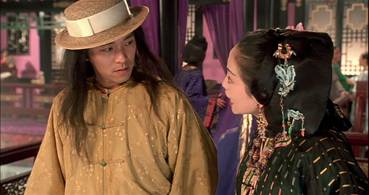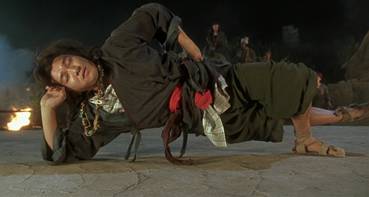|
The
name of Stephen Chow has become synonymous with kung-fu
comedy through the widespread success of Shaolin
Soccer and Kung
Fu Hustle, films that reached an international
audience after being bought up for distribution by Miramax
and Columbia Tristar respectively. Both were wild, inventive,
fast-paced, and very, very funny. But fans of martial arts
cinema will doubtless have been following Chow's career for some time,
charting the development from his
first starring role in Jeffrey Lau and Corey Yuen's
Du sheng (All for the Winner 1990) –
an enjoyable spoof of Jing Wong's God of Gamblers
(1989) – to his position today as one of the biggest stars
on the Hong Kong movie scene, as well as one of its most
successful directors. If you've come to Chow's work through
his more widely seen later films and you're looking to explore
the path that led to Shaolin Soccer, then
Hong Kong Legends are here to help with one of the key stepping
stones in the shape of the 1992 Miu chong yuen so
hat ngai, or King of Beggars.
Chow
plays So Chan, the spoilt, lazy, and dishevelled son of a
wealthy Peking General, who on visiting a local brothel
on a 25th birthday spending spree meets and falls for beautiful
prostitute Yu Shang, whom he announces he intends to marry.
She reluctantly agrees, but only if he proves himself to
her by winning the local Kung-Fu Scholar tournament, something
he aims to do through a combination of genuine fighting
skills and examiner bribery. Complicating matters is the
fact that Yu is not actually a real prostitute at all, but
a member of the organisation known as The Association of
Beggars, and is in the brothel to lure Chu – the Emperor's
most dangerous bodyguard who uses magic to supplement his
fighting skills – to his death as revenge for his murder
of her father, once the Association's leader. The plan is
foiled when conflict develops between Chu and the unknowing
Chan – a full scale fight is prevented, but when Chu exposes
Chan's cheating at the Tournament, Chan and his father are
stripped of their possessions and wealth and commanded to
live forever as beggars, leaving the way clear for Chu to
overthrow the kingdom.

Much
of this is traditional generic material, of course, with the
hero cast down by an all-powerful bad guy specifically so
that he can find his inner strength and nobility and rise up
to defeat this enemy, whose threat to the love of his life will allow him to effect the necessary rescue.
This is not only the familiar stuff of martial arts cinema (and
most Hollywood actioners, as it happens), it's the path
the audience expects them to follow, but with this in
mind writer Kin Chung Chan and directors Gordon Chan and
David Lam (and, I would wager, Chow himself) have considerable
fun playing with these expectations. Chan (the lead
character, not the writer or the co-director – this could get
confusing) is hardly the noble hero of straight-up genre
pieces, as while his scruffy arrogance is always engaging,
the prospect of him being dished a dose of reality doesn't seem
that bad a thing. When it happens, however, the humiliation
and pain is really piled on. He is repeatedly tricked of
victory in the Tournament, exposed
as an illiterate cheat when he wins by default (his opponent's
attempt to kill him with a poisoned dart backfires), stripped
of his home and his wealth and cast into the street, publicly
forbidden by Chu from demonstrating his skills for money,
and then horribly injured by him so that he is unable to
walk, let alone fight.
After
a surprisingly touching and comedy-free midsection that
highlights the sorry plight of Chan and his father, the
relentless optimism of the pre-poverty Chan re-emerges and
occasionally turns expectations on their heads. Forced by
soldiers who are threatening to arrest his father to eat
dog food, for example, Chan is surprised how delicious it is and he
and his father tuck hungrily in, turning humiliation into
a sort of oddball victory. His inevitable recovery is similarly
laced with offbeat touches, notably when his dream-induced reconstitution
at the hands of a beggar he was once kind to (an amusing
cameo from top fight choreographer and director Yuen Woo-ping) gives him the opportunity to enter a meeting of the
Association of Beggars in the manner of a reborn hero, only
to step forward and fall flat on his face.
This
is not the broad mugging and slapstick of Knockabout and its ilk,
nor is the action-comedy as densely developed as in Chow's
more recent works. But the balance the film strikes is for the most part
a great deal of fun, and there are enough inventive touches
to clearly point the way to things to come: the small blast
of magic force let loose by Chu that blows Chan's hat off
and imbeds it in a pillar; Chan's instinctive elbow hit
to the face when caught by surprise that leaves the brothel's
female owner with a bloody nose and a headache; the score cards
held up at the weightlifting event ("Failure"
for the montage of those crushed by the weights, "Brazen"
for Chan's refusal to try); the mass peeing that results
from the news that urine is a poison gas antidote ("Don't
worry, I peed a lot, we can share"); Chan's Sleeping
Lohan Kung Fu and the very concept of something called Dog
Beating Stick Kung Fu; and so on.

Technically,
King of Beggars is a very proficient and
executed on what at times is almost a grand scale, and as
ever Chow makes for a very engaging hero. The film's principal
weakness is that neither the comedy nor the action are developed
enough to really carry the film alone, and combined make
for an enjoyable rather than exceptional whole. But it IS
enjoyable and consistently so, and when the comedy does
click it can prove laugh-out-loud stuff. The action is always
efficiently handled, although the climactic final confrontation
between Chan and Chu is, in fight terms, a bit of a let
down. It should nevertheless prove essential viewing for
genre fans and anyone looking to widen their appreciation
of Stephen Chow, who is on fine form throughout and whose
sense of comic timing remains one of the comedy-action
genre's most valuable assets.
As
expected with a Hong Kong Legends release, the transfer
is largely first rate, with colour and contrast bang on
and not a dust spot to be seen. The level of detail is very
impressive, although some of this has been achieved via
visible edge enhancement, resulting in some halos and the
occasional instance of detail shimmering. Otherwise this
is well up to HKL's usual high standards. The framing is
1.85:1 and the picture is anamorphically enhanced.
The
5.1 Cantonese remix is also very nice, displaying impressive
range and separation on music and some sound and atmos effects,
with the surrounds also well used in this regard. Lower
frequencies are not widely used, but kick in nicely in some
of the music and the occasional sound effect. The original
mono soundtrack is also included for purists, as is expected
English dub, which is conducted in the usual exaggerated
American accents and frequently differs from the subtitles
in its 'creative' interpretation of the dialogue.
No
Bey Logan commentary! Boo! Oh well, we do have an Rags
to Riches: An Interview with Director Gordon Chan
(20:09), in which co-director Chan talks about Stephen Chow's
success, the original story (King of Beggars is
as old and famous Chinese fable) and his decision to change
it to suit the expectations of a modern cinema audience,
and the making of the film itself, which is always interesting.
My favourite anecdote reveals that the snow for the winter
scenes was actually ammonia-based fertiliser, which Chan
assures us "looked beautiful but smelt awful."
The interview is conducted in English with one (relevant)
use of the word "fuck" bleeped out, despite the
disc's 15 certificate.
Beggar's
banquet: Interactive Stephen Chow Biography
is a brief summary of the star's career, with links to three
relevant trailers.
Promotional
Gallery includes the UK Promotional
Trailer (1:06) and the Original
Theatrical Trailer (2:39). The UK trailer,
for reasons best known to the distributor, mistranslates
the held-up score cards, giving them three different scores
when even non-Chinese readers can see they are all the same.
You'll
also find trailers for eight other HKL DVD releases.
Nothing
too surprising in plot or character or even action, but
damned enjoyable and worthwhile for Stephen Chow's performance,
the handsome production values and some very well executed
comic moments.
For
a self-styled Platinum Edition this is a bit thin on extras
– only the interview raises the disc much above bare bones
– and the picture would have done fine without the edge
enhancement, but otherwise the film is well presented and
a must for fans of Chow's unique blend of action and comedy
– just don't go expecting something of Kung
Fu Hustle's intensity of ideas and incident
and you'll be fine.
|